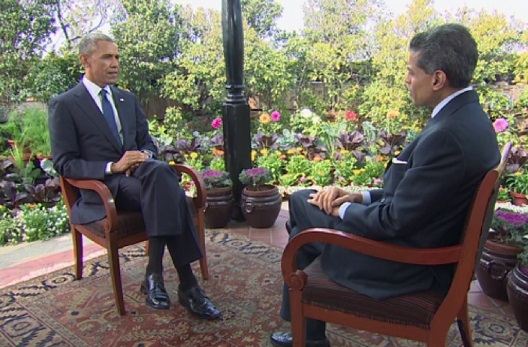 Some members of Congress and noisy portions of the media and blogosphere are vexed by President Barack Obama’s refusal to declare war on “radical Islam.” Their distress seemed to be only exacerbated by the President’s measured and sensible response to Fareed Zakaria during a CNN interview last Sunday when asked, “Are we in a war with radical Islam?” The President’s response, worth rereading in full, was just what it should be: a serious discussion with the American people about a complex problem with no easy solutions, including a clear explanation of why terminology can be dangerous.
Some members of Congress and noisy portions of the media and blogosphere are vexed by President Barack Obama’s refusal to declare war on “radical Islam.” Their distress seemed to be only exacerbated by the President’s measured and sensible response to Fareed Zakaria during a CNN interview last Sunday when asked, “Are we in a war with radical Islam?” The President’s response, worth rereading in full, was just what it should be: a serious discussion with the American people about a complex problem with no easy solutions, including a clear explanation of why terminology can be dangerous.
Here are three more reasons not to declare a “war on radical Islam”:
- There is no consensus on the definition of “radical Islam.” ISIS or al-Qaeda or al-Shabab provide an easy answer to this question and it is clear that we are at war with these groups. But being in a fight with specific groups and specific people in those groups is a lot different from being at war with a certain nebulous space on the spectrum of Muslim belief. Who will be the authority in the United States who will decide what is acceptable for Muslims to believe and what is not? Americans have never been comfortable with government making judgments about religious belief, but at the same time, a considerable body of conservative opinion appears to believe that Islam in any form is sympathetic to violence against non-believers. Will US Muslims be subjected to loyalty tests? Will we close our borders to Muslim students who wish to study at our universities? Who will provide guidance to the US military and intelligence apparatus on identifying the “enemy”? Will we rely on authoritarian regimes in Egypt or the Gulf to define “true Islam”?
- There is no implicit change to US foreign policy after having declared a war on “radical Islam.” Could we deal with Jordan, which tolerates elements of the Muslim Brotherhood, but at the same time has been subjected to the butchery of ISIS? How about Saudi Arabia, a country wedded to a form of Islam that many Muslims find extreme? Would we need to reject any notion of reaching agreements with Iran because of their official religious stands? Would the millions of Egyptians who believe in a very traditional form of Islam become the enemy along with the jihadists attacking Egyptian institutions? Do we put a new list of countries on the terrorism list? Would we only deal with so-called “moderate Muslims,” whatever that may mean?
- Declaring rhetorical wars would be a victory for the terrorists we want to defeat, as the President said in his interview. Their objective is to be seen as the legitimate face of and defenders of Islam. For a superpower like the United States, or even a power like France, to declare war on radical Islam serves to legitimize a group of people that we should be making every effort to marginalize. The Western media—not to mention politicians—have an obligation to treat the topic with a greater degree of seriousness and less vacuous name-calling. Media outlets need to think through how their dramatic descriptions of ISIS murders (and not just whether to show the acts) may act to encourage these publicity-hungry terrorists. Fear mongering is terrorism’s oxygen and their recruitment tool. They need to be pushed to the margins in all possible ways.
So What Can We Do?
The United States and its allies are in a conflict with certain groups who would like to convince the world that they are the true representatives of Islam. We will succeed in that war only if we stay focused on the key element of counterterrorism strategy: excellent intelligence gained through maintenance of a first-rate intelligence community and sharing of intelligence with others; the ability to project deadly force when needed against specific groups and targets who wish us harm; and enlistment of Muslim and non-Muslim countries and communities around the world to do their fair share in combatting terrorism and addressing its root causes—be those poor governance, weak states, religious incitement, or psychologically marginalized individuals looking for outlets for their rage.
Preventing the attraction to terrorism, as opposed to attacking known terrorists, is a long-term project that requires a serious approach. The contrived debate about labelling terrorism is both counterproductive and at odds with an American value system that separates religious belief from political considerations. Those actually doing the fighting against terrorists deserve better than bumper sticker slogans to guide their actions. They should not be asked to fight a dimly understood religious war.
Richard LeBaron, US Ambassador (ret.) was the founding Coordinator of the US Center for Strategic Counterterrorism Communications Strategy. He is a Nonresident Senior Fellow at the Atlantic Council.
Image: Screenshot of US President Barack Obama in an interview with CNN's Farid Zakaria, Sunday, February 1, 2015.
